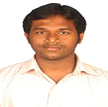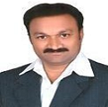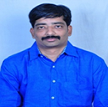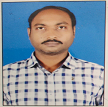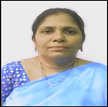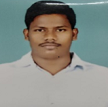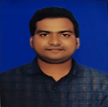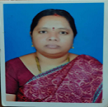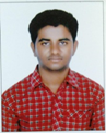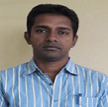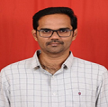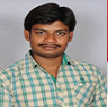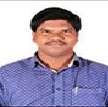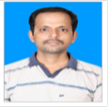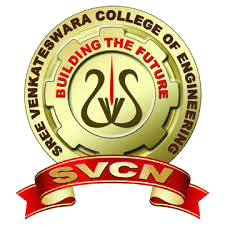eee
Electrical & Electronics Engineering (EEE)
The Department of Electrical and Electronics Engineering (E.E.E) in our college offers 4 years Bachelor of Technology (B.Tech) programme with 30 students as intake. The Department is committed to produce well-trained electrical graduates. This department has received twice ISO certification, accredited by NAAC with ‘A’ Grade in the year 2021 The Department is conferred with autonomous status from 2023.
The objective of EEE Department is to provide the best technical education to the aspiring Power Engineers. An Environment is provided where young minds can grow to their full potential and become strong, principled and committed citizens of India. The Department is continuously updating its facilities to make the students excel in all aspects in the area of Electrical Engineering. The Department has taken various initiatives to reduce the gap between academics and industry.
The Department has well qualified and dedicated team of teaching staff members. A conductive environment exists in the Department for both students and staff. Quality technical education is provided to the students in the core areas of the field to meet the challenges of globalization with the state of art equipments and laboratories. The department arranges expert lecture by the eminent personalities. Teaching and learning process is strengthened with regular feedback, both oral and written, from students. Besides periodical tests, well designed assignments, regular tutorial and remedial classes are arranged whenever it is required
A professional association “ELECTRIKA” has been formed to fulfill the ambitious goals and reach the heights of excellence in technical learning. The students and faculty are involving continuously in research activities, paper presentations at Journals.
The Department is progressing well to fulfill the vision of the Institute with a motto to“Create change makers for the development of nation”.
Empowering students to serve the Nation with value-based Education by imparting strong principles and practices of Electrical Engineering to shape them into skilled Engineers suitable to Industry, research and societal needs.
MISSION:M1: To prepare the students technically strong and excel in their career by providing quality teaching and learning process.
M2: Create research oriented culture through state of art laboratories to invoke the desire and ability of lifelong learning among the students for pursuing successful carrier.
M3: To develop creative thinking ability to apply the knowledge professionally with due consideration of social and ethical values
PROGRAM EDUCATIONAL OBJECTIVES (PEO’S)
PEO1: To provide students with the fundamental knowledge, methodologies and use of cutting edge technologies in the field of Electrical and Electronics Engineering.
PEO2: Graduates should have solid fundamentals in core and multidisciplinary domain for successful implementation of engineering products and also to pursue higher studies.
PEO3: Pursue professional growth through moral and continuous learning attitude by adapting the current trends towards the well being the society.
PROGRAM OUTCOMES (PO’S)
PO1: Engineering knowledge: Apply the knowledge of mathematics, science, engineering fundamentals, and an engineering specialization to the solution of complex engineering problems.
PO2: Problem analysis: Identify, formulate, review research literature, and analyze complex engineering problems reaching substantiated conclusions using first principles of mathematics, natural sciences, and engineering sciences.
PO3: Design/development of solutions: Design solutions for complex engineering
problems and design system components or processes that meet the specified needs with appropriate consideration for the public health and safety, and the cultural, societal, and environmental considerations.
PO4: Conduct investigations of complex problems: Use research-based knowledge
and research methods including design of experiments, analysis and interpretation of data, and synthesis of the information to provide valid conclusions.
PO5: Modern tool usage: Create, select, and apply appropriate techniques, resources, and modern engineering and IT tools including prediction and modeling to complex engineering activities with an understanding of the limitations.
PO6: The engineer and society: Apply reasoning informed by the contextual knowledge to assess societal, health, safety, legal and cultural issues and the consequent responsibilities relevant to the professional engineering practice.
PO7: Environment and sustainability: Understand the impact of the professional
engineering solutions in societal and environmental contexts, and demonstrate the knowledge of, and need for sustainable development.
PO8: Ethics: Apply ethical principles and commit to professional ethics and responsibilities and norms of the engineering practice.
PO9: Individual and team work: Function effectively as an individual, and as a member or leader in diverse teams, and in multidisciplinary settings.
PO10: Communication: Communicate effectively on complex engineering activities with the engineering community and with society at large, such as, being able to comprehend and write effective reports and design documentation, make effective presentations, and give and receive clear instructions.
PO11: Project management and finance: Demonstrate knowledge and understanding of the engineering and management principles and apply these to one’s own work, as a member and leader in a team, to manage projects and in multidisciplinary environments.
PO12: Life-long learning: Recognize the need for, and have the preparation and ability to engage in independent and life-long learning in the broadest context of technological change.
PROGRAM SPECIFIC OUTCOMES (PSO’S)
PSO1: Students are able to analyze and design the electrical and electronic circuits with the knowledge of courses related to circuits, power electronics, power system and control systems.
PSO2: Get employed in allied industries through their proficiency in program specific domain knowledge, specialized software packages or become an entrepreneur.
Course Outcomes (COs)
S.No | Regulation | View |
1 | R20 Regulation | |
2 | R19 Regulation | |
3 | R15 Regulation |
Syllabus
S.No | Regulation | View |
1 | R20 | |
2 | R19 | |
3 | R15 |
DEPARTMENT OF ELECTRICAL & ELECTRONICS ENGINEERING
List of Faculty
S.No | Name Of The Faculty | Qualification | Designation |
1 | Dr. V.ANIL KUMAR | M.E, Ph.D | Professor & HOD |
2 | Dr. G. MADUSUDHANA RAO | M.Tech, Ph.D | Associate Professor |
3 | Dr. C. NITHYANANDAM | M.E, Ph.D | Associate Professor |
4 | T. SRIKANTH | M.Tech | Assistant Professor |
5 | T. SREEKANTH | M.Tech,(Ph.D) | Assistant Professor |
6 | S. NARMADHA | M.E | Assistant Professor |
7 | Y.V. NIRANJAN KUMAR | M.Tech,(Ph.D) | Assistant Professor |
8 | K. GIRISH KUMAR | M.Tech | Assistant Professor |
9 | V. VISHNU VARDHAN | M.Tech | Assistant Professor |
10 | N. SUDARSHAN RAO | M.Tech | Assistant Professor |
11 | P. RAMESH | M.Tech | Assistant Professor |
12 | SD. LIYAKHATH | M.Tech | Assistant Professor |
13 | K. RATNA JYOTHY | M.Tech, (Ph.D) | Assistant Professor |
14 | M.RAMU | M.Tech | Assistant Professor |
15 | K.VENKAIAH | M.Tech | Assistant Professor |
Faculty Profiles
ELECTRICAL CIRCUITS LABORATORY
The Electrical Circuits Laboratory assists the students to impart with essential knowledge of electrical and electronic circuit design and analysis by providing hands on experience to design different electrical and electronic circuits on bread boards with different active and passive components. This Lab gives the practical learning and use of various instruments like Multimeter, Oscilloscopes, Function Generators, Wattmeter etc.. This lab also introduces MATLAB, a circuit simulation software tool. It enables the students to gain sufficient knowledge on the programming and simulation of DC and AC circuit analysis techniques, analyze complicated circuits using different network theorems, acquire skills of using MATLAB software for electrical circuit studies.
Major Equipment- Regulated power supply
- Cathode ray oscilloscope
- Function Generators
- Multi meters
- Digital Voltmeters & Ammeters
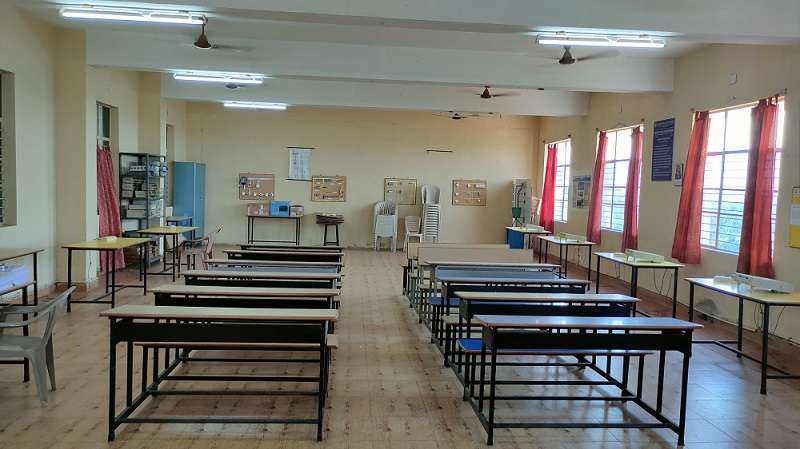

ELECTRICAL MACHINES LABORATORY ( DC & AC Machines)
The Electrical Machines Laboratory is designed to support the theoretical study of Electromechanical Devices with suitable experiments. This Lab Concerns with electrical machines of different types i.e, DC Machines and AC Machines to impart knowledge on characteristics and, operation of the machines and give them experimental skill, familiarize with the constructional details of the Machines. It enables the students by providing the essential facilities to augment their concepts on the fundamentals of rotating machines. The experimental setups on transformers, inductions motors and synchronous machines make the students to get the insights of the machines. This lab consists of machines which are mounted as industrial type of assembly to give the students industrial feel. Experiments on VFDs make the students industry ready.
Major Equipment:- DC shunt Motor- shunt Generator set
- DC compound Motor- compound Generator set
- DC shunt Motor- series Generator set
- DC compound Motor with loading arrangement
- DC Shunt Motor with loading arrangement
- DC Shunt Motor coupled with Non-Salient pole Alternator
- DC Shunt Motor coupled with Salient pole Alternator
- 3-phase squirrel cage induction motor
- 3-phase slip ring induction motor
- 1-phase induction motor with loading arrangement
- Laboratory rectifier
- 1-phase transformer
- 3-phase transformer
- 1-phase Auto transformer
- 3-phase Auto transformer
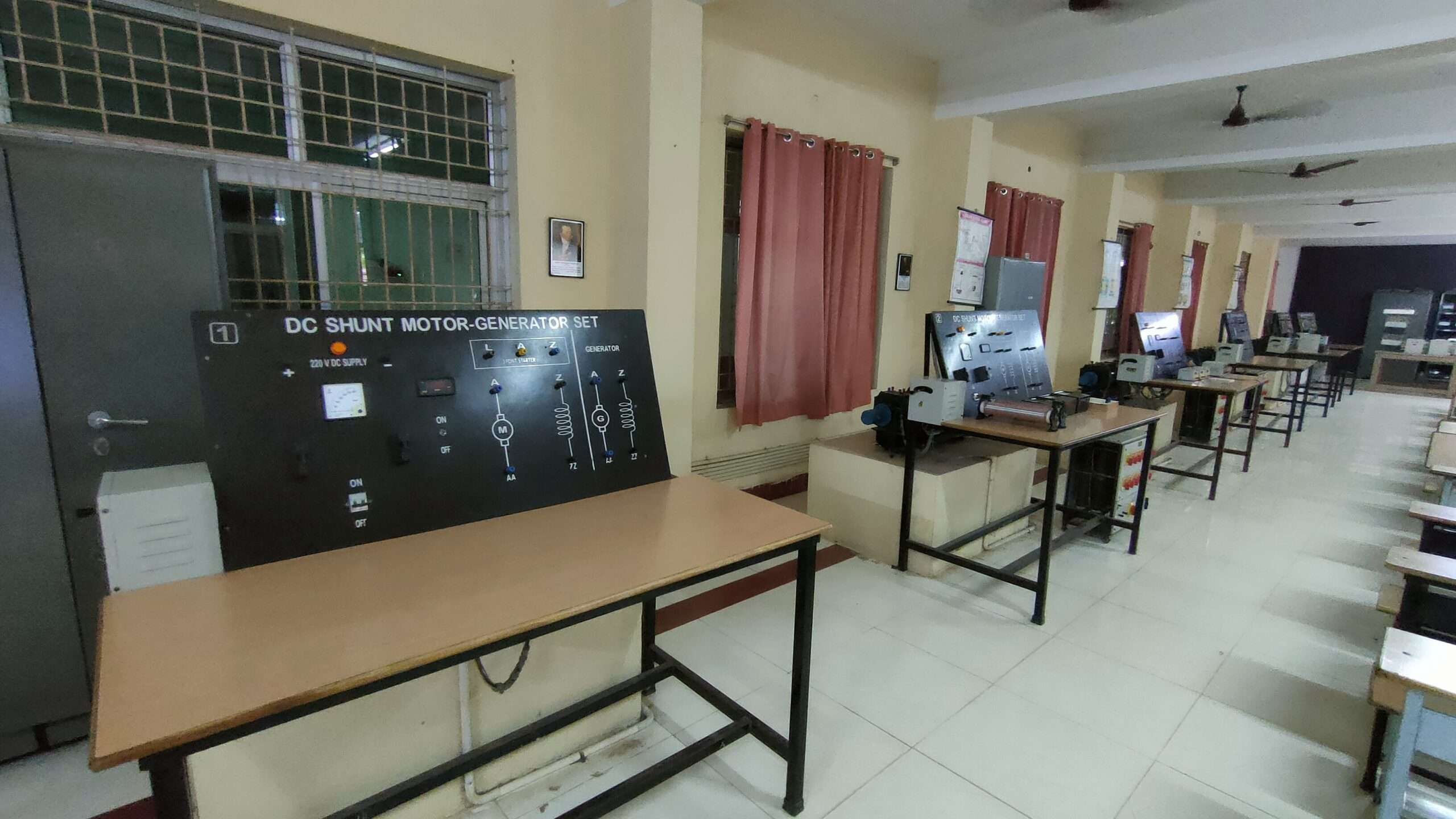
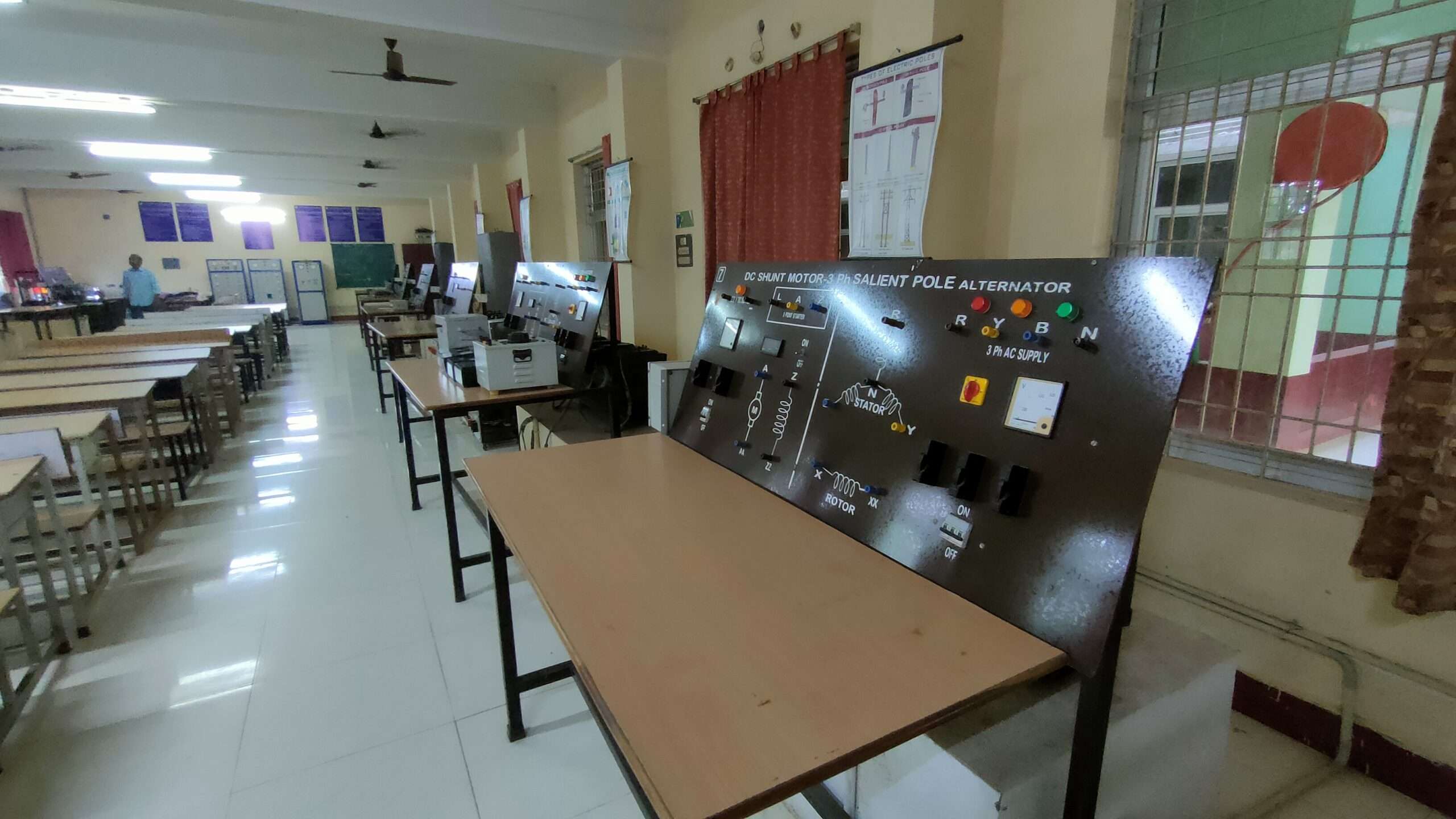
CONTROL SYSTEMS AND SIMULATION LABORATORY
The aim of the Control Systems Laboratory is to provide sound knowledge in the basic concepts of linear control theory and design of control systems to understand the methods of representation of systems and design a system and calculate the transfer function, analyzing the stability of the system with time domain approach and frequency response analysis, using MATLAB The students also study the transient and steady state response and effect of PID Controllers on the system.
Major Equipment:- Characteristics of Synchro’s Study Unit
- Time Response of Second Order System Study Unit
- Effect of Feed Back on DC Servo Motor Study Unit
- Effect of P,PI,PD,PID Controllers on a Second Order System Study Unit
- Lag & Lead Networks Study Unit
- Transfer Function of DC Generator Study Unit
- Temperature Controller Using PID Controller Study Unit
- DC Motor Speed Control Using PLC Study Unit
- Characteristics of Magnetic Amplifier Study Unit
- Transfer Function of DC Motor Study Unit
- Characteristics of AC Servo Motors Study Unit
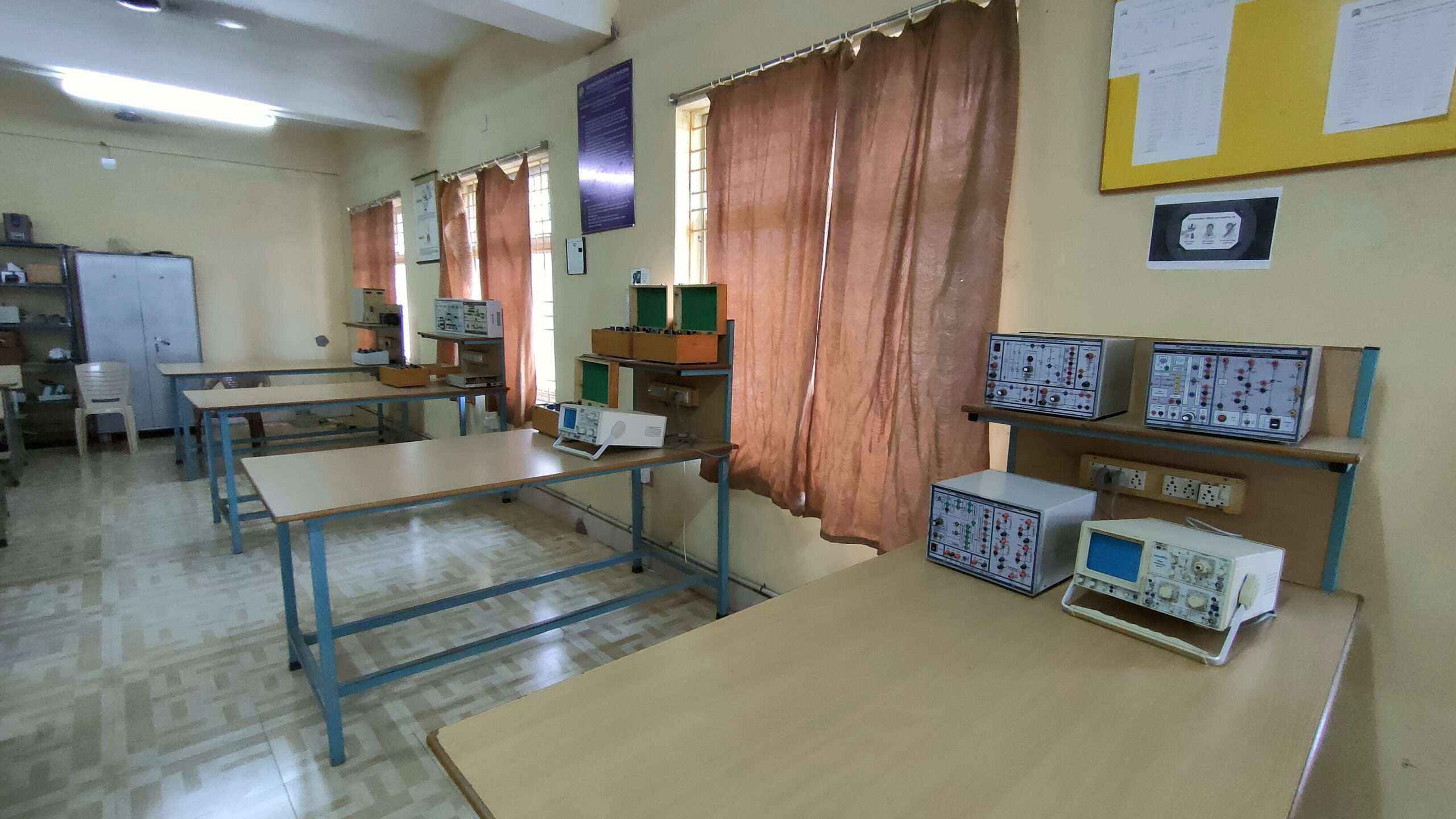
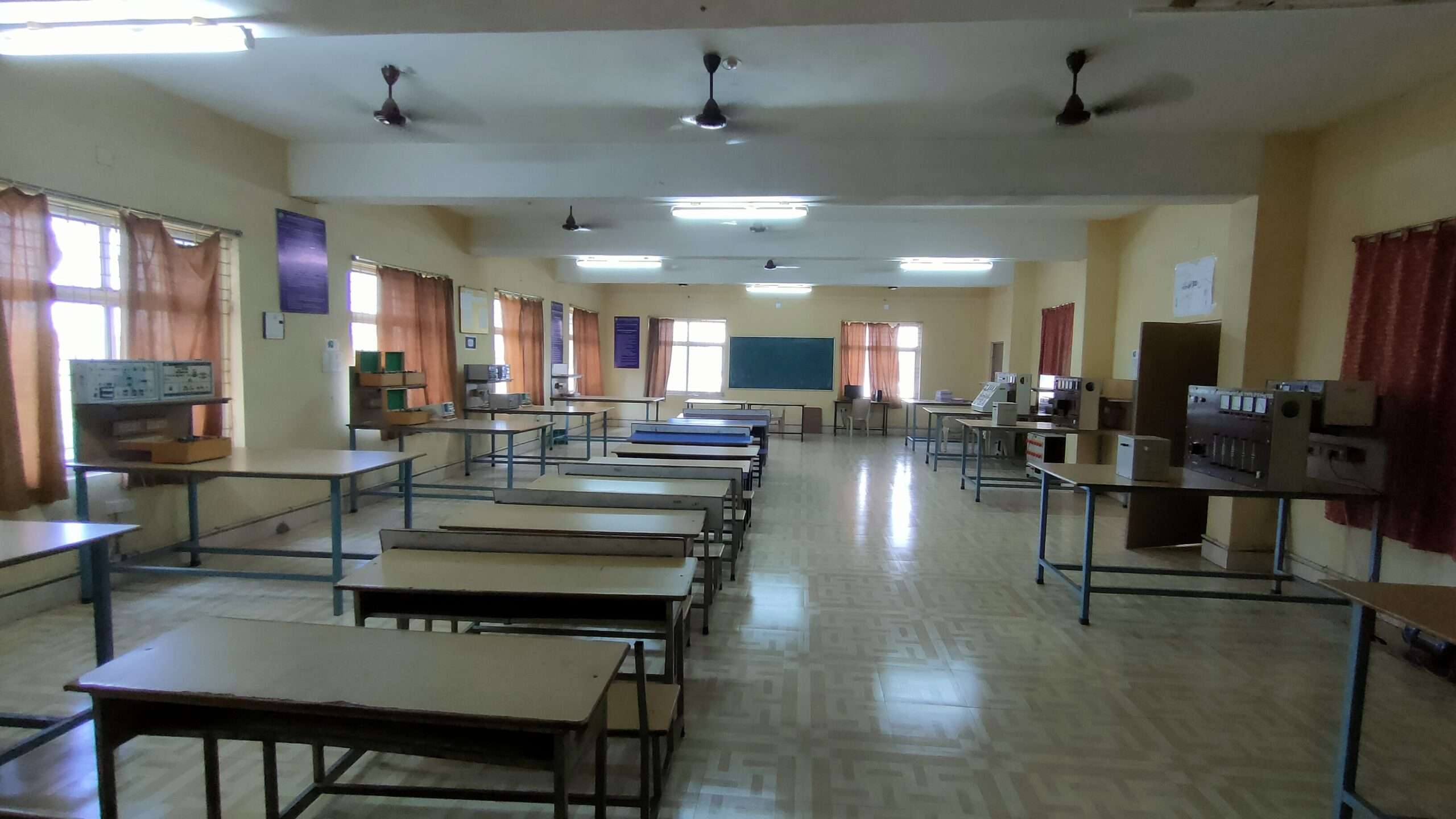
ELECTRICAL MEASUREMENTS LABORATORY
The aim of the Electrical Measurements Laboratory is to reinforce the students with an adequate experience in the measurement of different quantities and also to expertise in handling the instruments. The students get exposed with basic operations of sensors and their real time usage. It also provides facilities to train the students in the measurement of displacement, resistance, inductance, torque and angle etc., and on AC, DC bridges The knowledge on sensors and signal conditioning circuits help the students to implement them in various projects and real time applications.
Major Equipment:- Dielectric constant measurement trainer
- Kelvin bridge trainer
- Power measurement by two wattmeter method
- LVDT trainer
- Strain guage trainer
- Calibration and testing of single phase energy meter
- Calibration of dynamometer power factor
- Crompton DC potentio meter
- Schering bridge and Anderson bridge
- Measurement of three phase reactive power
- Measurements of parameters
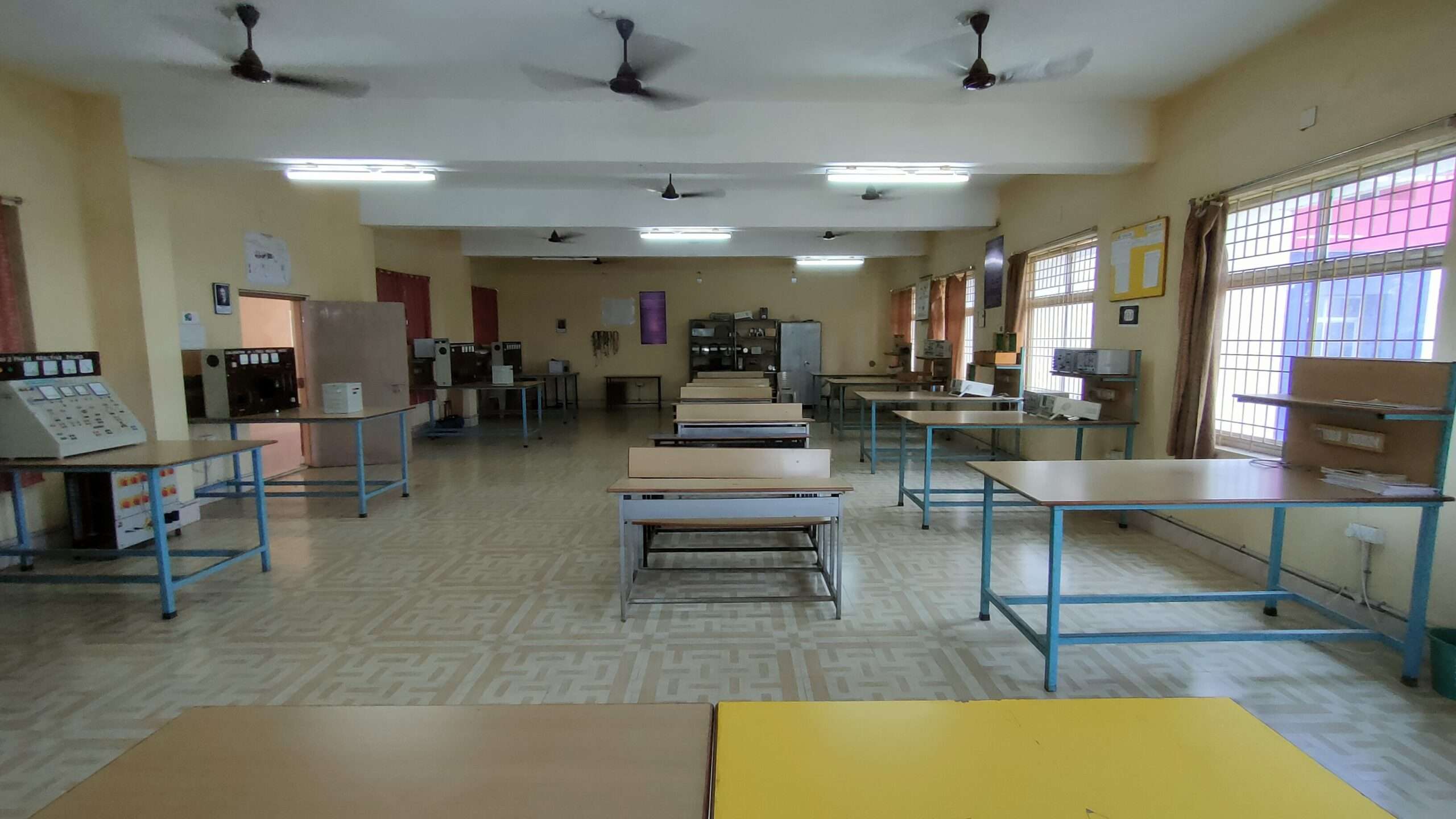
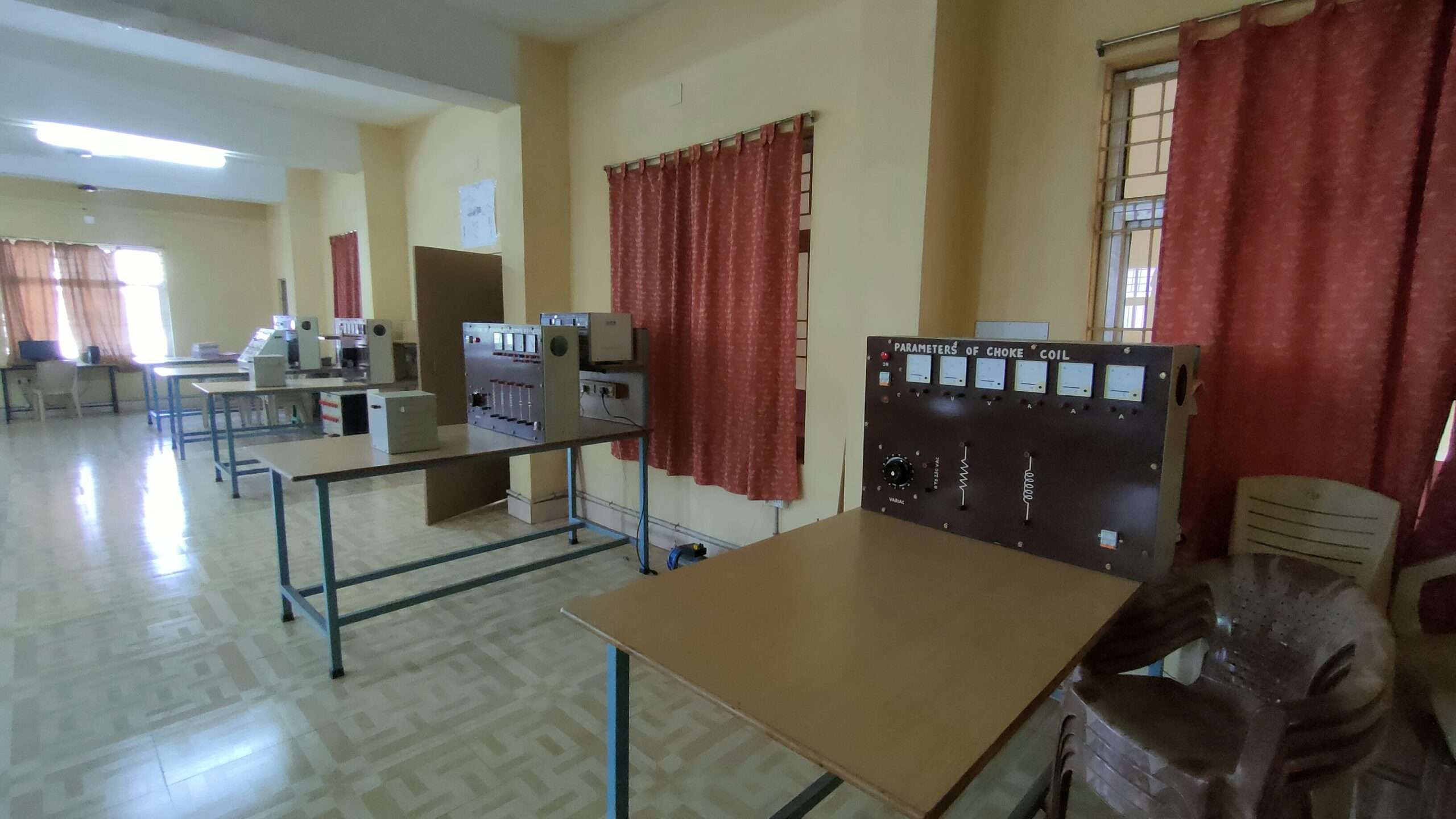
POWER ELECTRONICS LABORATORY
The objective of the Power Electronics laboratory is to study the characteristics of switching devices and its applications in Rectifiers, AC voltage controllers, Inverter and Choppers. It also acquaint with the application of power electronic devices for conversion, control and conditioning of electric power. Further it aids the students to acquire an overview of different types of power semiconductor devices and to cognize the operation, characteristics and performance parameters of controlled rectifiers. The principle of operation, switching techniques, modulation techniques and harmonic reduction techniques in PWM inverters are studied in the lab. It also provides experience with common components such as motors, batteries and power semiconductors. The lab facilitates faculty and students who are conducting research, industry sponsored projects in power converters in particular and electrical energy conversion in general.
Major Equipment:- IGBT & MOSFET Static characteristics module
- R,RC,UJT Firing module
- Single phase SCR fully controlled converter
- Forced commutation circuits
- Single phase SCR half controlled converter
- Digital Multimeter
- SCR vi characteristics study trainer
- Single phase AC Voltage controller
- Jones chopper trainer module
- Single phase Cyclo converter with R & RL loads
- Three phase SCR half controlled converter
- Single phase series inverter
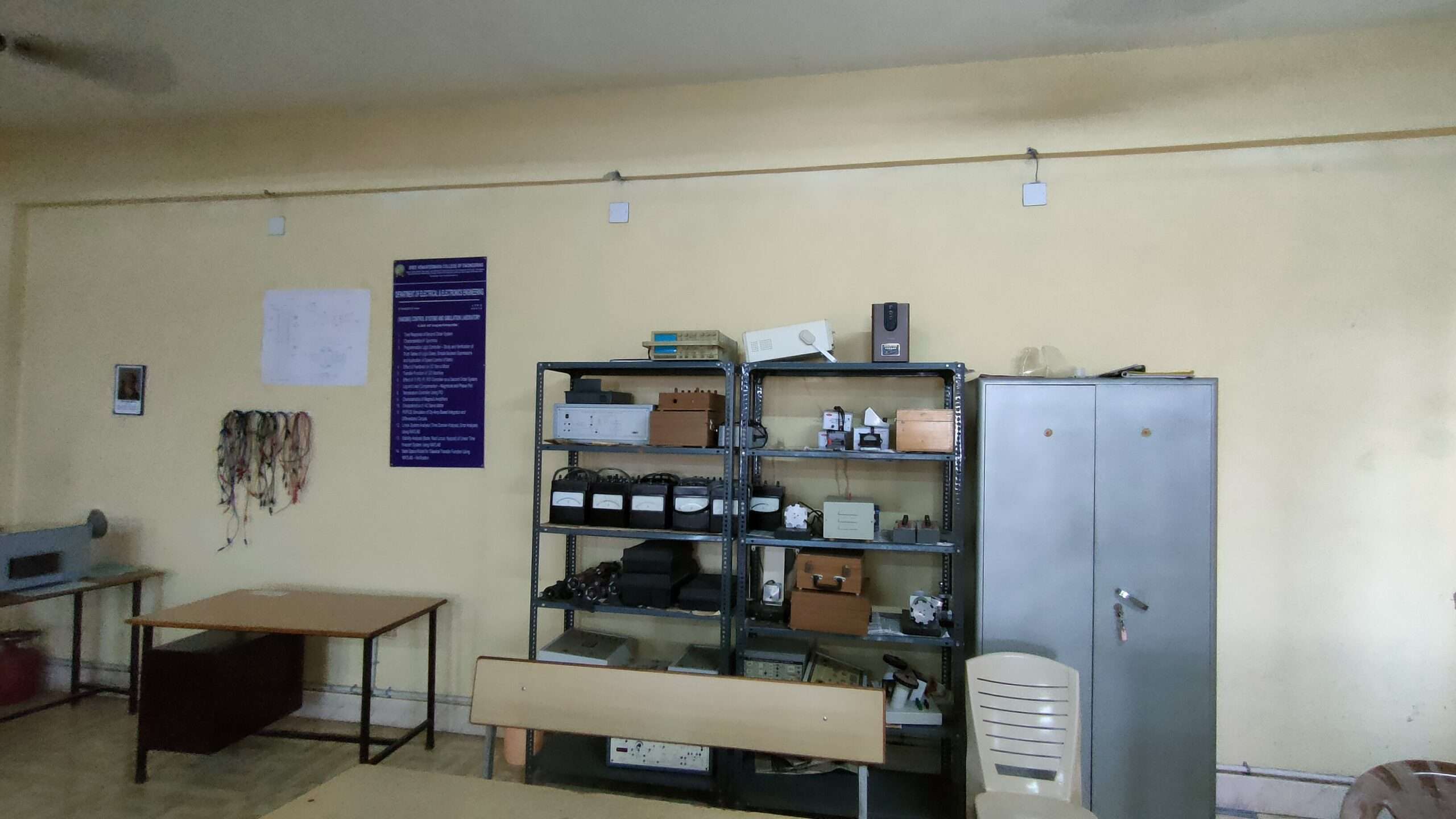
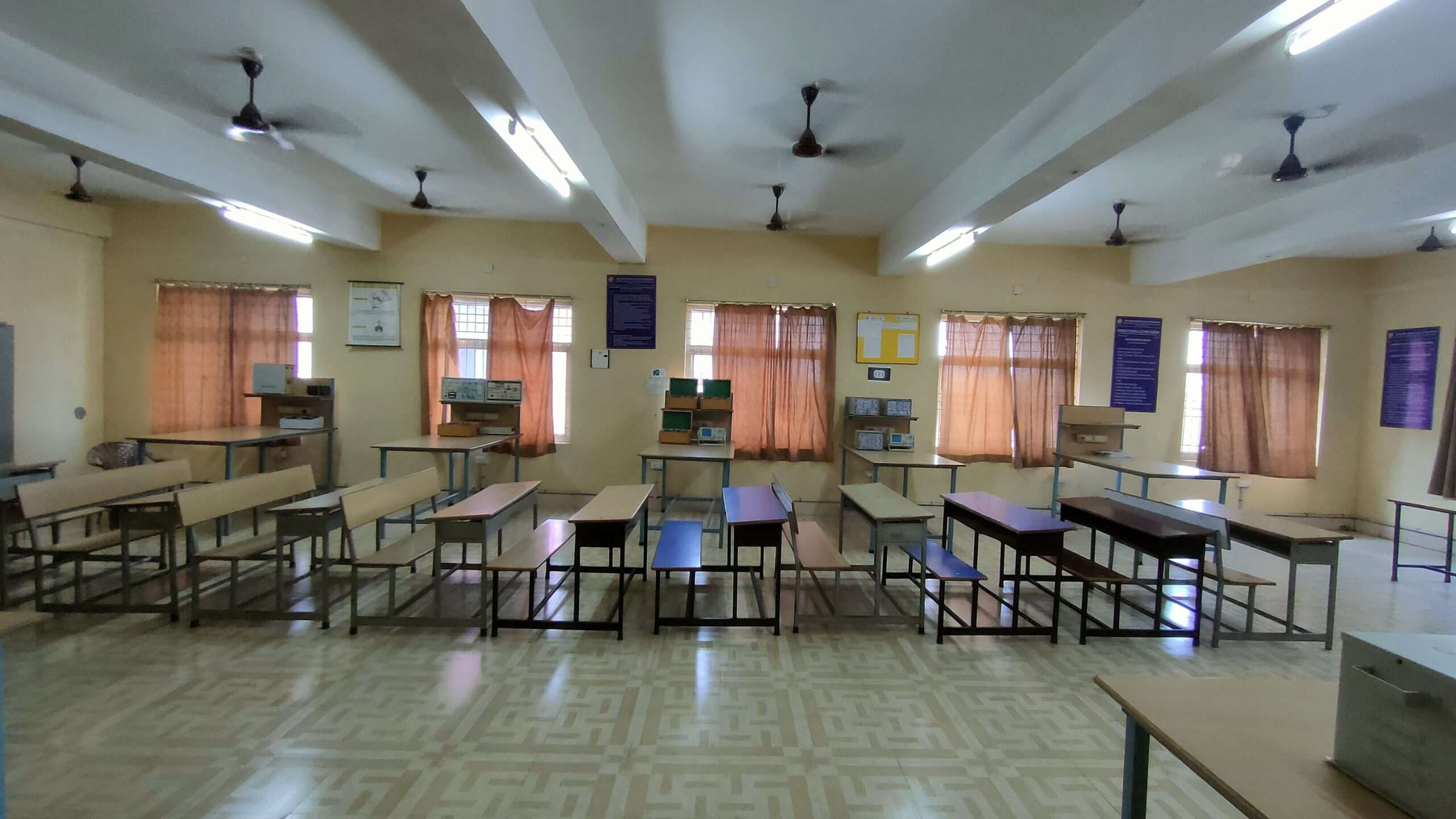
SIMULATION LABORATORY
1.To provide background and fundamentals of MATLAB tool for the analysis and processing of signals and to generate various continuous and discrete time signals.
2 To provide an overview of signal transmission through linear systems, convolution and correlation of signals and sampling.
3.To understand the concept and importance of Fourier and Z-Transforms
4.To introduce Digital logic design software for constructing various types of Digital circuit used in real time application.
SPICE can do several types of circuit analyses. Here are the most important ones:
1. Non-linear DC analysis: calculates the DC transfer curve.
2. Non-linear transient and Fourier analysis: calculates the voltage and current as a function of time when a large signal is applied; Fourier analysis gives the frequency spectrum.
3. Linear AC Analysis: calculates the output as a function of frequency. A bode plot is generated.
4. Noise analysis
5. Parametric analysis
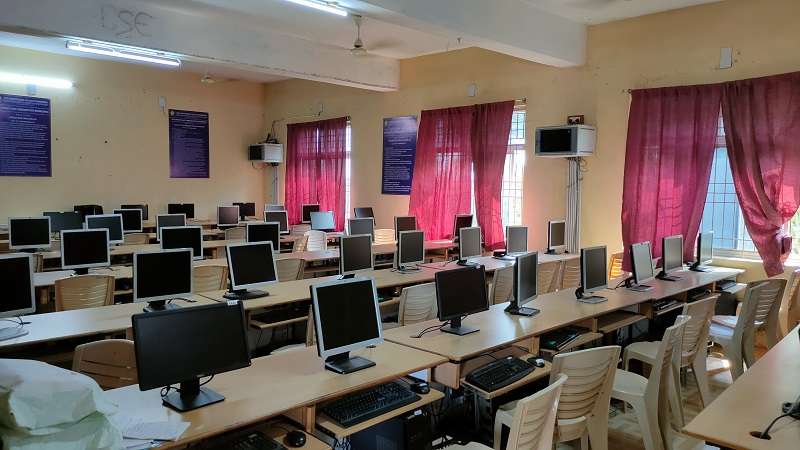
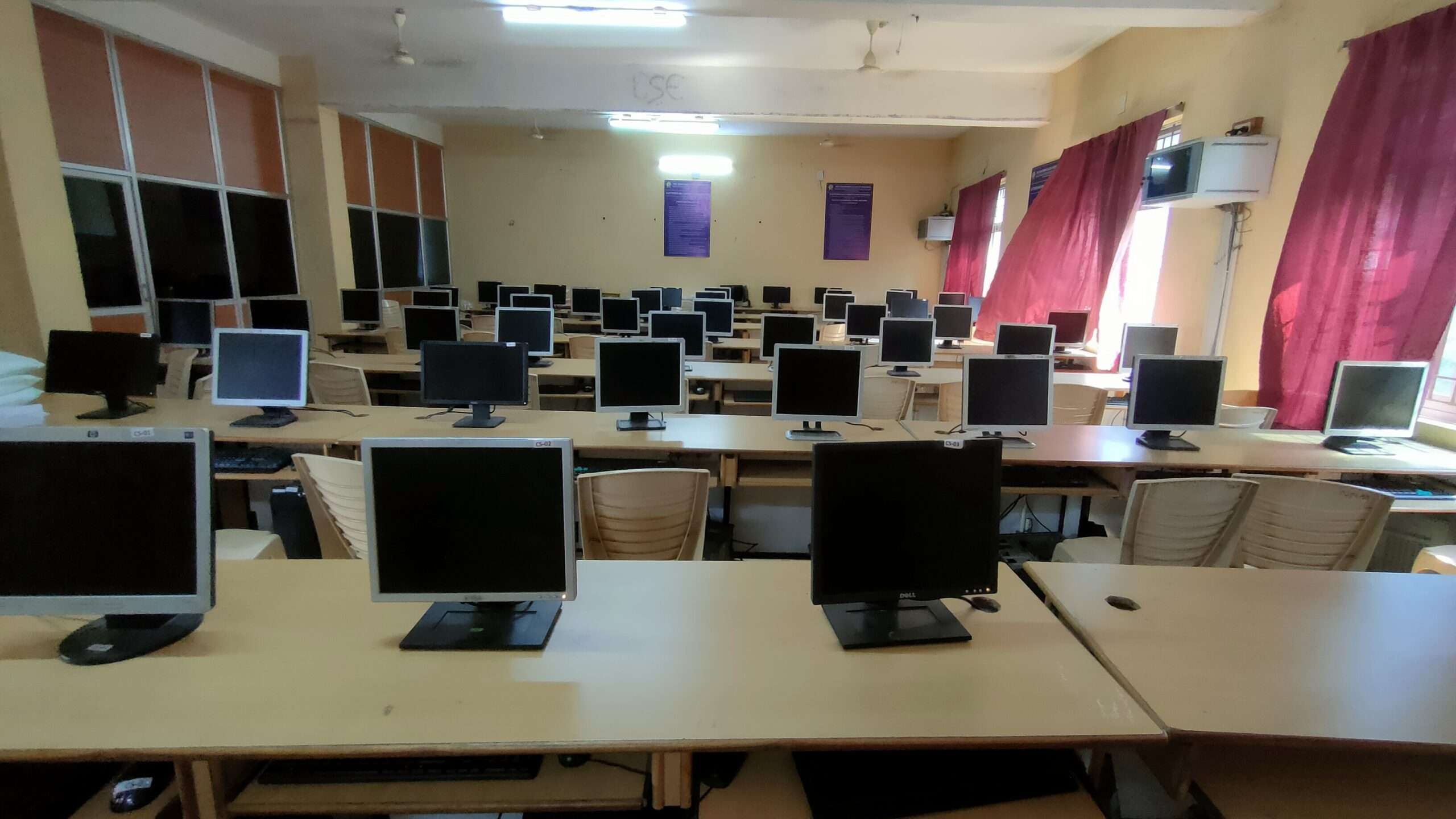
Faculty Development Programs
S.No | Academic Year | View |
1 | 2022-23 | |
2 | 2021-22 | |
3 | 2020-21 | |
4 | 2019-20 |
Workshops
S.No | Academic Year | View |
1 | 2021-22 | |
2 | 2020-21 | |
3 | 2019-20 |
Faculty Achievements
Publications
S.No | Academic Year | View |
1 | 2022-23 | |
2 | 2021-22 | |
3 | 2020-21 | |
4 | 2019-20 |
Patents
S.No | Academic Year | View |
1 | 2022-23 | |
2 | 2021-22 |
NPTEL Certifications
NPTEL Certifications |
EEE NPTEL VIDEOS
| S.No | Name of the Subject | Topic Name | View |
|---|---|---|---|
| 1 | DC Machines & Transformers |
Operating principles and Construction of 1-
Phase Transformers Testing of 1-Phase Transformers Efficiency of 1-Phase Transformers Voltage Regulation of 1-Phase Transformers Parallel Operation of 1-Phase Transformers Introduction to 3-Phase transformers Construction of 3-Phase transformers Analysis & Testing of 3-Phase transformers Operating Principles of DC Machines Constructional features of DC Machines Generated EMF & Torque Armature Reaction Commutation DC Shunt Generators Separately Excited DC Generators Compound Generators Characteristic of DC shunt motors Testing of DC shunt motors Testing of DC series motors |
View |
| 2 | Basic Electrical Circuits |
Current Voltage Electrical Elements & Circuits KCL & KVL Voltage Source and Current Source Resistor, Inductor and Capacitor |
View |
| 3 | Power System Protection (IIT Roorkee) |
Fundamentals of Protective Relaying Current based Relaying Scheme Protection of Transmission lines using Distance Relaying Protection of Transformers Protection of Generators Arc Interruption theory in Circuit Breakers |
View |
| 4 | Power Electronics | Power devices-Diodes, SCR,Traic,GTO,
MOSFET and IGBT Single Phase Uncontrolled and Controlled Rectifiers Three phase Rectifiers Single Phase and Three phase AC Voltage Controllers and Cyclo converters VSI and CSI |
View |
| 5 | Electrical Measurements |
PMMC Instruments Electrodynomic Instruments Moving Iron Instruments Electrostatic Instruments Derivation of Deflecting Torque in Electrostatic, Moving Iron and Electrodynomic Instruments Bridges Potentiometers and single phase energy meters Errors in Instrument Transformers |
View |
| 6 | FACTS |
Introduction Multilevel Inverter Shunt Compensator and Static Var Compensators Series Compensators UPFC Comparison of UPFC with Series and Shunt devices and IPFC |
View |
| 7 | Elecromagnetic Thoery (EMF) |
Introduction to Electromagnetic Thoery Vetor analysis and Coordinate system Electric potential, Gauss’s law, Divergence, Poission’s and Laplace’s equation Polarization and Boundary condition Boit savart’s law, magnetic force, torque and dipole Maxwell’s equation and wave propagation and solution of Helmholtz equation |
View |
| 8 | HVDC Transmission |
Comparison of HVAC and HVDC systems, Type of HVDC Transmission systems Analysis of HVDC converter HVDC system control features, Control Schemes Power flow analysis of AC-DC systems Multi-terminal HVDC system HVDC system application in wind power generation |
View |
| 9 | Power system operation and Control |
Power system Controls, Generator and Transmission line Constraints Stability problems in power systems Frequency control and speed governor Reactive power control, Power flow control and HVDC Converters Real and Reactive power scheduling Structure of deregulated industry and Indian scenario |
View |
| 10 | Power System Analysis |
Modeling of Power System components, Network admittance and Impedance atrices Load flow studies Economic Operation of Power systems Short Circuit Studies and un Symmetrical and Symmetrical components |
View |
| 11 | Network Signal and Systems |
Bode plot and pole zeros Driving point immitance functions Two element synthasis Graph theory Image and Iterative Impedance RLC Two terminal Synthesis |
View |
| 12 | Control Engineering | Introduction to feed back problem and basic
feed back structure Concepts of Stability and Routh’s stability criterion Root locus Nyquist stability criterion |
View |
EEE Lecture Notes
I YEAR-I SEM
| S.No | Subject Name | Notes | PPT |
|---|---|---|---|
| 1 | Linear Algebra & Calculus | ||
| 2 | Applied Physics | ||
| 3 | Communicative English | ||
| 4 | Fundamentals Of Electrical Circuits | ||
| 5 | Engineering Drawing |
I YEAR-II SEM
| S.No | Subject Name | Notes | PPT |
|---|---|---|---|
| 1 | Differential Equations and Vector Calculus | ||
| 2 | Chemistry | ||
| 3 | C-Programming & Data Structures | ||
| 4 | Electronic Devices & Circuits |
II YEAR-I SEM
| S.No | Subject Name | Notes | PPT |
|---|---|---|---|
| 1 | Complex Variables &Transforms | ||
| 2 | Electrical Circuit Analysis | ||
| 3 | Managerial Economics & Financial Analysis |
II YEAR-II SEM
| S.No | Subject Name | Notes | PPT |
|---|---|---|---|
| 1 | Numerical Methods & Probability Theory | ||
| 2 | Power Electronics | ||
| 3 | AC Machines | ||
| 4 | Electromagnetic Field Theory |
III YEAR-I SEM
| S.No | Subject Name | Notes | PPT |
|---|---|---|---|
| 1 | Power System Architecture | ||
| 2 | Control Systems | ||
| 3 | Measurements & Sensors | ||
| 4 | Switchgear and Protection |
IIIYEAR-II SEM
| S.No | Subject Name | Notes | PPT |
|---|---|---|---|
| 1 | Power System Analysis | ||
| 2 | Digital Computer platforms |
IV YEAR-I SEM
| S.No | Subject Name | Notes | PPT |
|---|---|---|---|
| 1 | Measurements & Sensors | ||
| 2 | Power System Protection | ||
| 3 | Power System Operation & Control | ||
| 4 | Principles of Digital Signal Processing | ||
| 4 | Management Science |
IV YEAR-II SEM
| S.No | Subject Name | Notes | PPT |
|---|---|---|---|
| 1 | Electrical Distribution System Automation | ||
| 2 | Energy conservation and management |
STUDENT PARTICIPATIONS IN CO-CURRICULAR ACTIVITIES (EXTERNAL)
S.No | Academic Year | View |
1 | 2022-23 | |
2 | 2021-22 | |
3 | 2020-21 | |
4 | 2019-20 |
STUDENT Achievements
CO-Curricular Activities
S.No | Academic Year | View |
1 | 2022-23 | |
2 | 2021-22 | |
3 | 2020-21 | |
4 | 2019-20 |
Publications
S.No | Academic Year | View |
1 | 2022-23 | |
2 | 2021-22 |
NPTEL Certifications
NPTEL Certifications |
INTERNSHIPS
S.No | Year Of Internship | View |
1 | 2022-23 | |
2 | 2021-22 | |
3 | 2020-21 | |
4 | 2019-20 | |
5 | 2018-19 | |
6 | 2017-18 |
DEPARTMENT OF ELECTRICAL & ELECTRONICS ENGINEERING
Workshops:
S.No | Academic Year | View |
1 | 2022-23 | |
2 | 2021-22 | |
3 | 2020-21 | |
4 | 2019-20 |
Guest Lectures:
S.No | Academic Year | View |
1 | 2022-23 | |
2 | 2021-22 | |
3 | 2020-21 | |
4 | 2019-20 | |
5 | 2018-19 | |
6 | 2017-18 | |
7 | 2016-17 |
Industrial Visits:
S.No | Academic Year | View |
1 | 2022-23 | |
2 | 2021-22 | |
3 | 2019-20 | |
4 | 2018-19 |
Placements
S.No | Academic Year | View |
1 | Placements Record for AY 2021-22 | |
2 | Placements Record for AY 2020-21 | |
3 | Placements Record for AY 2019-20 |
DEPARTMENT OF ELECTRICAL AND ELECTRONICS ENGINNERING
E-Content
You Tube Video:
S.No | Name | Link |
1 | ELECTROMAGNETIC FIELDS | 1. Magnetic boundary conditions 2. Inductance of solenoid and toroid 3. MFI due to solenoid |
2 | POWER QUALITY | 1. Sources of Power Quality Problems 2. Power Quality and Need Of Power Quality |
3 | ENERGY CONSERVATION | 1. Energy Efficiency in AC 2. Instrument used for Audit |
4 | POWER SYSTEM OPERATION & CONTROL |
Instructional Materials:
S.No | Subject Name | Link |
1 | DC MACHINES & | |
2 | POWER ELECTRONICS | |
3 | HVDC & FACTS | |
4 | POWER QUALITY | |
5 | POWER SYSTEM |
Virtual Lab:
S.No | Name Of the Lab | Virtual Links |
1 | ELECTRICAL CIRCUIT ANALYSIS LAB | |
2 | DC MACHINES &TRANSFORMERS LAB | |
3 | POWER ELECTRONICS LAB | |
4 | AC MACHINES LAB | |
5 | CIRCUITS SIMULATION AND ANALYSIS | |
6 | CONTROL SYSTEMS LAB | |
7 | MEASUREMENTS AND SENSORS LAB | |
8 | POWER SYSTEMS ANALYSIS LAB | |
9 | APPLICATIONS OF SOFT COMPUTING |
Association-“ELECTRIKA”
A professional association “ELECTRIKA” has been formed on 08.11.2014 with the Moto of “ENLIGHTING ENERGY EVERY WHERE”.
The main aim of the association is to encourage the students to prove their worth through various technical and non technical activities and also truly proves the unity amongst the whole EEE department in proper way.
In pursuit of this aim various activities have been conducted like Working Models, Paper Presentations, Energy Conservation Programs, Work Shops, Poster Exhibits and Guest Lecturers for exploring of Inherent talent of students to reach their Goals.
Student Association Activities
S.No | Academic Year | View |
1 | 2022-23 | |
2 | 2021-22 | |
3 | 2020-21 | |
4 | 2019-20 |
Professional Society Activities
S.No | Academic Year | View |
1 | 2022-23 | |
2 | 2021-22 |
DEPARTMENT OF ELECTRICAL & ELECTRONICS ENGINEERING
S.No. | Name of the Industry |
1 | SV Technologies |
2 | NoobTran Pvt.Ltd |
3 | Green Corner Technologies |
4 | Take off education group |
5 | Yuvan Construction & Power Technologies Pvt. Ltd |
6 | NELCAST |
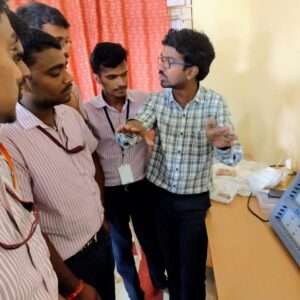
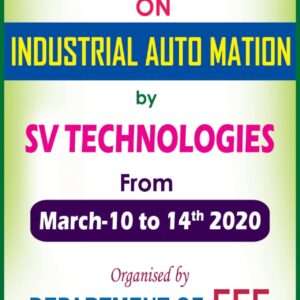
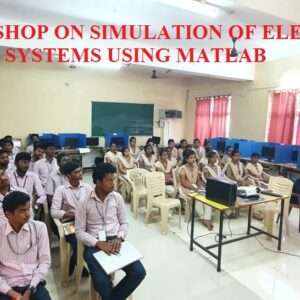
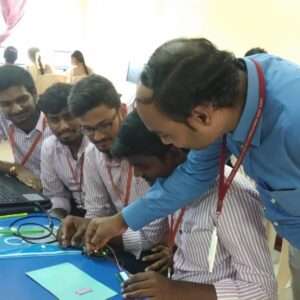
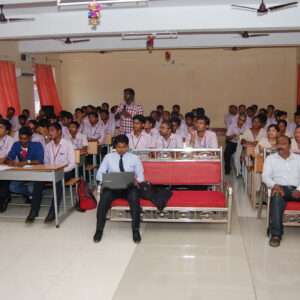
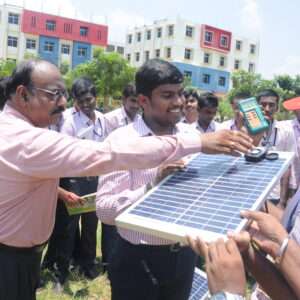
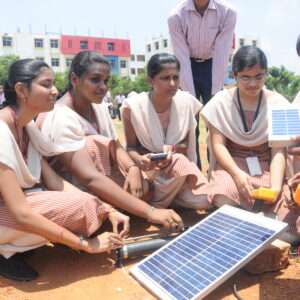
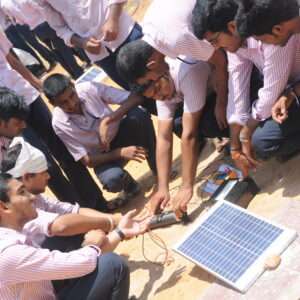
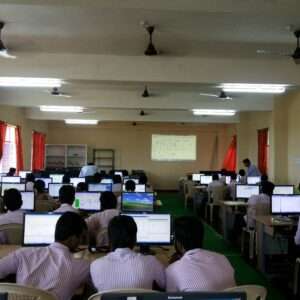
LAB PHOTOS
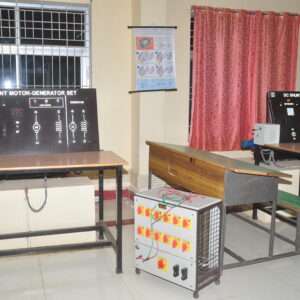
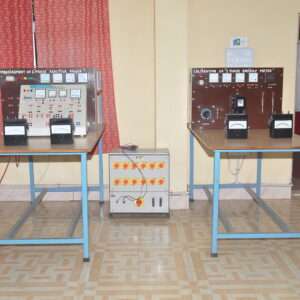
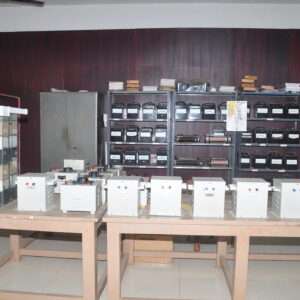
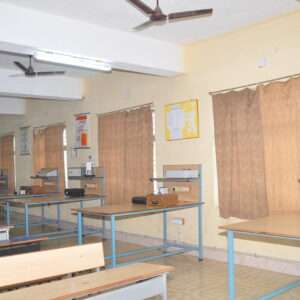
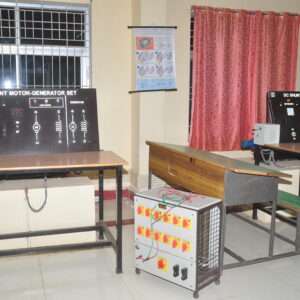
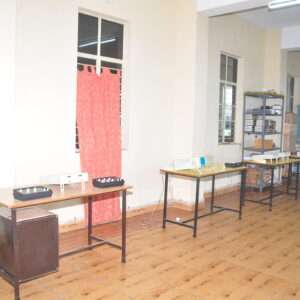
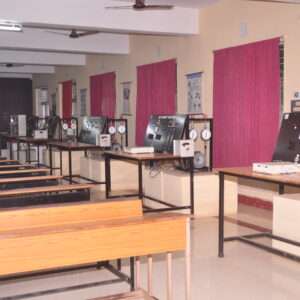
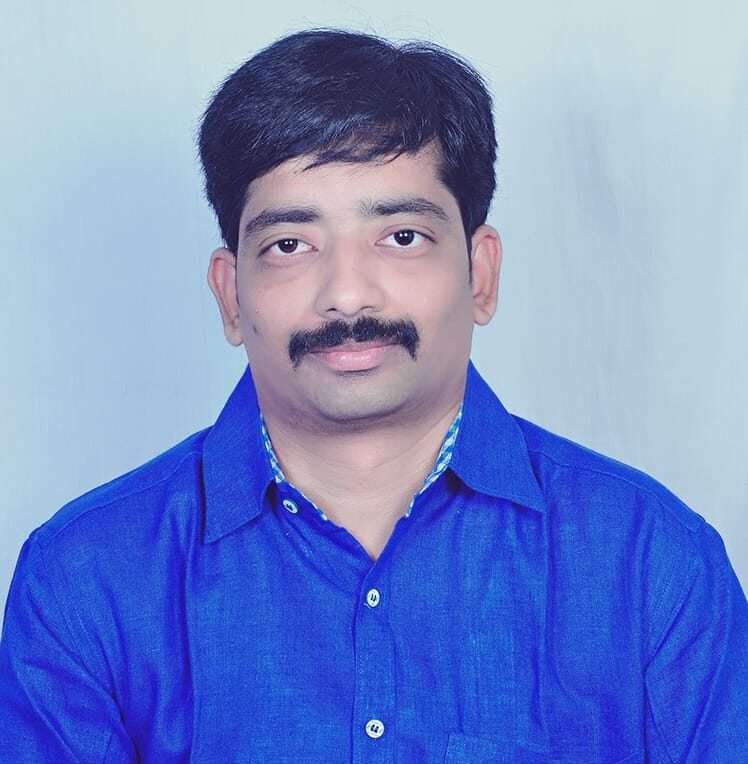
Dr.V.Anil Kumar


